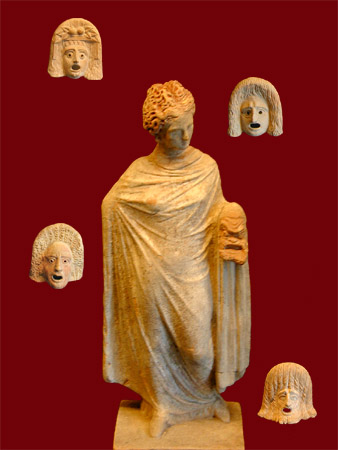
Woman with terracotta masks
Tanagra (325-300 BCE)

Erotium is among the celebrated courtesans of Roman comedy, aptly named "Little Lovey" (a diminutive derived from the name of the Greek god of love Eros). Emerging from her home to joyously greet Menaechmus in Act I, Scene III, Erotium embodies for him the pleasure (voluptas) that grants him temporary freedom from industria — Roman civic life and the diligence of his legal wife Matrona, who oversees his every move. While Roman comedy portrays the meretrix as either grasping or kindly and solely from the perspective of the male client, ancient literature offers glimpses of the real women who used their bodies for profit (e.g., Livy describes the noble Hispala Faecenia who had to turn to prostitution to earn a living after her mistress freed her; Ulpian preserves the legislation on prostitution). While Roman law did not discriminate among them, there were at least three levels of prostitute: the independent courtesan, who had a few select clients, like Mark Antony's Volumnia Cytheris, an actress; the meretrix who operated in a house of prostitution; and the scortum who was a common streetwalker. Erotium’s charms, business sense and luck brought her a rather comfortable, protected, and financially successful life, which was probably true as well for the more fortunate real-life meretrices. She had slaves (among them, a personal maid and a cook) and a wealthy loyal clientele willing to pay high prices to keep access to her limited. Ancient sources tell us that meretrices enhanced their attractiveness and advertised their services with flashy, revealing, and brightly-colored clothing (their mantle was saffron-colored, emblematic of their greed, ob avaritiam luteum, De comoedia VIII, 6); they applied cosmetics and wore jewelry, perfume, and elaborate hairstyles. Erotium's experienced skill at her trade and her difference from Matrona is demonstrated in this scene through her ready response to Menaechmus, her witty and playful remarks and her fondly seductive language. The parasite Peniculus, also a master at earning his living through flattery, attributes her compliance to the rapacious and mercenary tactics of the meretrix, employed to obtain money and property from her lovers. Not for the first time, Erotium receives an expensive gift from Menaechmus: he stole his wife's mantle (palla), which she delights in for its monetary value and its significance as the outer garment of the respectable wife. In exchange, she secures Menaechmus' devotion by giving him the treatment he expects but does not get from Matrona.
ER. Anime mi, Menaechme, salve. PEN. Quid ego? ER. Extra numerum es mihi.
PEN. Idem istuc aliis adscriptivis fieri ad legionem solet.
MEN. Ego istic mihi hodie adparari iussi apud te — proelium.
185 Hodie id fiet: in eo uterque proelio potabimus.
Uter ibi melior bellator erit inventus cantharo,
tua est legio: adiudicato, cum utro hanc noctem sies.
Ut ego uxorem, mea voluptas, ubi te aspicio, odi male.
190 PEN. Interim nequis quin eius aliquid indutus sies.
ER. Quid hoc est? MEN. Induviae tuae atque uxoris exuviae, rosa.
ER. Superas facile, ut superior sis mihi quam quisquam qui impetrant.
PEN. Meretrix tantisper blanditur, dum illud quod rapiat videt;
195 nam si amabas, iam oportebat nasum abreptum mordicus.
MEN. Sustine hoc, Penicule: exuvias facere quas vovi volo.
PEN. Cedo, sed obsecro hercle, salta sic cum palla postea.
MEN. Ego saltabo? Sanus hercle non es. PEN. Egone an tu magis?
Si non saltas, exue igitur. MEN. Nimio ego hanc periculo
200 surrupui hodie. PEN. Meo quidem animo ab Hippolyta subcingulum
Hercules haud aeque magno umquam abstulit periculo.
MEN. Cape tibi hanc, quando una vivis meis morigera moribus.
ER. Hoc animo decet animatos esse amatores probos.
PEN. Qui quidem ad mendicitatem properent se detrudere.
205 MEN. Quattuor minis ego emi istanc anno uxori meae.
PEN. Quattuor minae perierunt plane, ut ratio redditur.
MEN. Scin quid volo ego te accurare? ER. Scio: curabo quae voles.
MEN. Iube igitur tribus nobis apud te prandium accurarier.
PEN. Atque aliquid scitamentorum de foro obsonarier:
210 glandionidam suillam, laridum, pernonidam
aut sincipitamenta porcina aut aliquid ad eum modum,
madida quae mi adposita in mensam miluinam suggerant;
MEN. Atque actutum. ER. Licet ecastor. MEN. Nos prodimus ad forum.
Iam hic nos erimus. Dum coquetur, interim potabimus.
215 ER. Quando vis veni: parata res erit. MEN. Propera modo.
Sequere tu. PEN. Ego hercle vero te et servabo et te sequar,
Click on the underlined words for translation aids and commentary, which will appear in a small window. Click on the icon link
![]() to the right of the line for related images.
to the right of the line for related images.